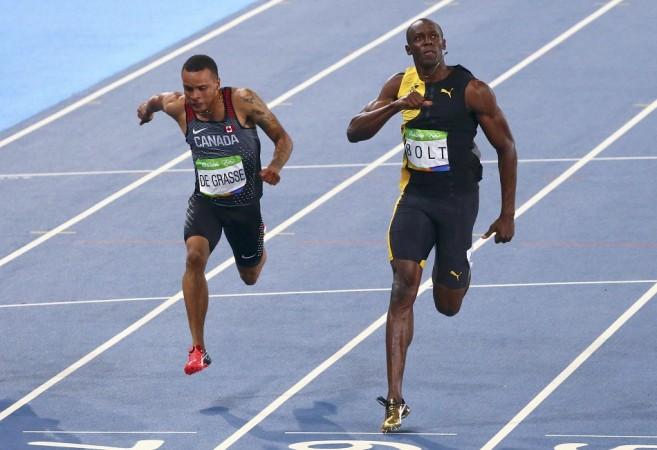
Jamaican sprinter Usain Bolt, regarded as the fastest person ever timed, has presented an interesting puzzle for the scientists to solve. How is the 29-year-old always faster than the rest of the athletes or in other words, what is the reason behind his magnificent speed? What really sets him apart from the rest?
According to research, it is the way Bolt takes his strides and the amount of time he spends in air that makes him stand out. Compared to other athletes or amateur runners, Bolt takes fewer strides, but longer ones.
Scientists say that an amateur runner often takes between 50 to 55 steps to complete a 100 metres run, while an elite sprinter takes just 45 steps.
The other reason given to us by physics is that professional athletes seem to spend a lot of time in air than on ground as compared to amateurs.
According to a BBC report, studies led by US-based researcher Peter Weyand established that at top speed, an elite sprinter's foot will be in contact with the ground for an average of 0.08 seconds compared to that of an amateur whose feet touches the ground for nearly 0.12 seconds.
Experts opine that fastest sprinters are likely to spend 60 per cent of the racing time in the air (with no contact with the ground) while the amateur athletes spend 50 per cent of the time in contact with the ground.
But despite all the scientific reasoning, Bolt's genes too make him exceptional.
One of the reasons why Bolt takes longer steps than the other athletes is because he is 6 feet 5 inches tall. Having long legs gives him an added advantage of taking longer steps to set himself into motion.
"Bolt is a genetic freak because being 6ft 5ins tall means he shouldn't be able to accelerate at the speed he does given the length of his legs. At the beginning of a race you want to take short steps in order to accelerate, but because he's so tall he can't do that. But then when he reaches top speed he has a massive advantage over everyone else because he's taking far fewer steps," former Great Britain sprinter Craig Pickering was quoted as saying by BBC.
So, it is not that much about speed as it has to do with the length of the steps that makes athletes like Bolt fastest.
Bolt is the first man to hold both the 100 metres and 200 metres world records since fully automatic time became mandatory. At the Rio 2016 Olympics, he became the first track athlete in Olympic history to win three gold medals in one discipline, with his win in the 100 metres sprint.














